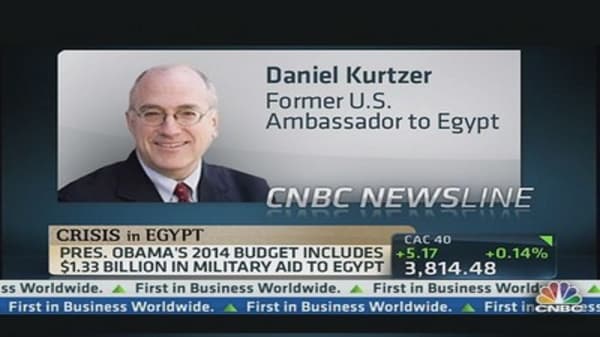However, Turkish Foreign Minister Ahmet Davutoglu told Reuters on Thursday that Morsi's dismissal was a "military coup" and branded it "unacceptable." Morsi's Muslim Brotherhood has also alleged the deposed president was the victim of a coup.
"Coup" comes from the French "coup d'etat," or "stroke of state." Webster's New World College Dictionary defines it as the "sudden, forcible overthrow of a ruler, government, etc., sometimes with violence, by a small group of people already having some political or military authority."
Most likely aware of these concerns, the Egyptian army has said it has no interest in ruling the country.
On Thursday, an Egyptian constitutional court judge appointed by Hosni Mubarak—the strongman leader ousted by the Arab Spring uprising—was sworn in as acting president.
But according to Maha Azzam, Egypt expert and associate fellow at international think tank Chatham House, the United States had not done enough to show it is defending democracy in Egypt and should condemn what she called a military coup.
Read More from NBC News
Mubarak-era judge takes over as Egypt's interim president
Egypt power shift Q&A: Was it a coup? What happens next
'Arab Spring is not over yet': Israel watches Egypt warily
Otherwise, it "will be understood in the Arab world as an antagonistic move against a Islamist president," she said. Other countries in the region will hear a message that American pro-democracy rhetoric is not matched by its action.
"Despite [the United States'] words for the support for democracy, it is ready to see [Morsi] replaced through unconstitutional means, and that sets a bad precedent for the United States," Azzam said.
Jon Alterman at the Center of Strategic and International Studies disagreed. He said the United States has already warned Egypt's military that it needs to respect the rule of law and civilians' rights.
It has also made clear that it supports a broad-based "consultative" approach that includes Egyptians from across the political spectrum.
"[The United States] has cautioned [the military] about the implications of a removing a democratically elected government," Alterman said. "It seems to me the U.S. statements support broad consultations."
While the Obama administration may say it supports democracy, by backing the military that just overthrew a democratically elected government, the United States is doing the opposite, according to Azzam.
(Read More:Egypt Launches Crackdown on Muslim Brotherhood After Morsi's Ouster)
In addition, she said, the stance risks alienating a huge swath of the population: Muslim Brotherhood supporters.
"The Muslim Brotherhood have shown a commitment to the democratic process and non-violence," Azzam said. Morsi's ouster could result in "Islamist activists saying democracy doesn't work and doesn't deliver if you are an Islamist."
Now that they face disillusionment, the worry is that they and other political Muslims will denied a place in politics.
"We can't have an open society that is only open to secularists and leftists. Everyone has a right to engage politically," Azzam said.
Alterman agreed that involving all sectors of society is essential to helping build a healthy democracy.
"The whole purpose of the democratic process is not to make the winners feel good about winning but for those who lost to feel that they can win in the future," he said.
But in the end, the United States will have a limited impact on whether or not democracy takes root in Egypt, Alterman said.
"What the U.S. says and does may move the needle to some degree, but there will be a lot of Egyptians who believe that the U.S. has done the wrong thing no matter what it says or does," he added.
—By Mandy Clark, NBC News




